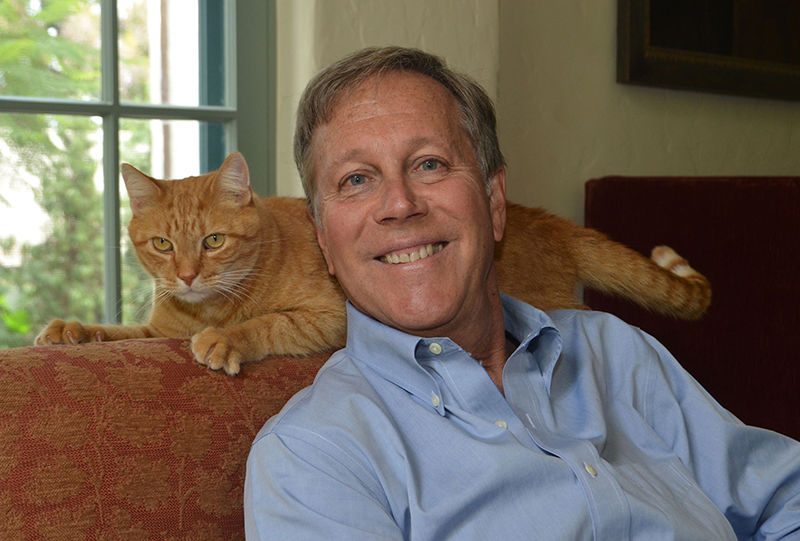Dana Gioia, California’s new poet laureate, was born to a working-class family and raised in L.A.’s South Bay. “I love California. It’s my place. I think writers are strongest when they are rooted in a specific place.”
He feels the same way about Catholicism. “The particular richness of the Catholic imagination is to be joyfully alert to the beauties of creation, while conscious of another level of reality behind it,” he said.
“I consider myself a pew-level Catholic. For me the connection I have to everyone in the parish is one of the essential gifts of the Church. It makes me remember that no one exists in isolation. The Catholic Church does not need their writers pretending that they’re members of the curia.”
Educated at Stanford and Harvard, Gioia was the first in his family to attend college. He served as chairman of the National Endowment of the Arts from 2003 to 2009. His areas of expertise include jazz and opera.
“All my Mexican uncles were in the Merchant Marine. Because of that, I value education in any number of ways, not just economically. Creative writing professionals seem to forget that average people of 50 years ago still loved poetry. It was a big part of American culture.”
Gioia’s “99 Poems: New & Selected” (Graywolf) was released March 1. Publishers Weekly said, “Readers searching for classically styled poetry that is unflinchingly sincere and honest will find what they need in the voice of this master poet.” Garrison Keillor read four of Gioia’s poems on “Writer’s Almanac.”
“This book of ‘99 Poems’ represents a huge moment in my life as a writer. My new book is not a new book; for me, it’s the book: the core of my creative life over the last 40 years,” Gioia said.
“A Catholic writer is both physical and metaphysical. That’s very true of my poetry. I don’t often write about explicitly religious subjects. There are maybe a dozen poems in my collection — “The Angel with a Broken Wing,” “Homage to Soren Kierkegaard” — but all of my poetry reflects my Catholicism as world view.”
The organization of the book is very original. The collection is divided into six sections: “Mystery,” “Place,” “Remembrance,” “Stories,” “Songs” and “Love.”
“Nobody does these things by theme, but I designed the book for readers. I don’t think readers much care in what chronological order the poems were written. Think often they are looking for a poem that matches their mood.”
The audience for his work has grown slowly over time.
“I’ve never been the darling of the critics, the official taste-makers. I don’t believe the purpose of a classical education is to cut us off from our fellow human beings. When I was starting off, I was accused of being elitist because I used rhyme and meter. That always struck me as absurd. I think the average person loves those techniques. I never tried to make my poetry a barrier between it and the average person.”
He writes for the alert and intelligent reader, the reader of theology, history, quality fiction, not for the academic. “Mine are the best readers to have because they come voluntarily in pursuit of pleasure and insight, not because the book has been assigned to them for a class.”
He sees his role as bringing poetry to everyone.
“I’m genuinely and deeply honored to be the state poet laureate. I want to travel all over the state, especially to small rural communities where nationally-known poets don’t usually visit. I aim to focus on high schools and public libraries, the great civic institutions of literacy. Anybody, even the homeless, can come into a library,” he said.
“I want to be a poet laureate for everyone, not just other writers. I want everyone in the community to feel free to participate.”
Gioia holds the Judge Widney Professor of Poetry and Public Culture at the University of Southern California. He’s also putting together a State Park Service public reading at Marin County’s Mount Tamalpais as “a place that feeds the imagination and the soul. I believe in a community of writers, but I also believe the community should be in the service of a broader community.”
He will give a reading at the South Pasadena Public Library on Wednesday, March 30, at 7 p.m.
Gioia and his wife Mary have two grown sons, both writers. They lost their firstborn son in infancy.
“We convert because we have an experience that grabs us by the throat and we don’t understand why,” he observes. “We puzzle it out in retrospect.”
PENTECOST
After the death of our son Neither the sorrows of afternoon, waiting in the silent house, or the night no sleep relieves, when memory Repeats its prosecution. Nor the morning’s ache for dream’s illusion, nor any prayers Improvised to an unknowable god Can extinguish the flame. We are not as we were. Death has been our pentecost, And our innocence consumed by these implacable Tongues of fire. Comfort me with stones. Quench my thirst with sand. I offer you this scarred and guilty hand Until others mix our ashes.
Heather King is a blogger, speaker and the author of several books.

